- Home
- Catherine Anderson
Strawberry Hill Page 2
Strawberry Hill Read online
Page 2
Less than a mile up the mountain, a dead sow lay mostly buried in a fall of rocks, and Slade couldn’t help but think this had to be her baby. Normally a cub remained near its deceased mother as long as it could, but maybe the rockslide had frightened this one so badly that it ran. The explosion of sound must have been deafening. The hail of huge rocks would have made the ground tremble. This little fellow, being so young, could have gotten so turned around in the forest that he couldn’t find his way back. Now he was in trouble. Leghold traps were treacherous. Slade hated the damned things.
He tried to think of some positive outcomes for the cub if he released it, but in reality there was only one, that another sow in the area with nursing cubs would adopt him. That was a long shot. Some sows would accept a nursing baby planted by humans in their birthing dens, but once they took their cubs out into the world, they grew protective and cautious. Even the appearance of a lost cub could get their hackles up. Slade could understand why. Most cubs of nursing age had their own mothers, who might strongly object to the interference of another sow.
After considering his options, Slade walked back to where Bogey and Pistol waited and drew his cell phone from his pocket. He texted his foreman, Wyatt, who kept his phone on him at all times, set to vibrate. “On Flotsam Trail, about a half mile up. Bear cub in trap. Bring men, blankets, and first aid.” He pressed SEND. Then as an afterthought, he sent a postscript. “Vet wrap, too.”
Slade questioned his own sanity as he led his horse and dog farther down the trail. If he turned that cub loose, what were the odds that it would find a kindhearted sow to feed and protect it? Slade knew that was a fairy-tale ending. The baby would probably die out in the wild by itself. Slade stared hard at the rifle he always carried in a saddle sheath when he rode in a wilderness area. No matter how he mentally circled it, he knew a quick death for the baby was far more merciful than starvation. But, damn it, he’d never sighted in on a young creature and pulled the trigger. Newborn animals were helpless. They needed to be protected so their species could thrive for generations to come.
Most humans had an inherent soft spot for babies, he assured himself. He wasn’t alone in his feelings. He sighed and resigned himself to the fact that he didn’t have it in him to put that cub out of its misery, not when there was a chance, no matter how slight, that it might survive.
While waiting for his men to arrive, Slade felt as if every second lasted an hour. The cub continued to bleat and moan, and every sound made Slade’s heart twist. He wished the poor thing would stop trying to get loose. With every jerk, the trap would do more damage to its leg. But the cub kept struggling.
In the distance Slade heard the roar of a ranch ATV. By the sound of the engine, he determined that it was the Honda Pioneer side-by-side, which resembled a golf cart but had stouter framework, a higher undercarriage, a lot more power, and tires that could crawl over most woodland obstacles. He was glad Wyatt had decided against using horses. The Honda covered ground faster. The thought no sooner crossed Slade’s mind than he saw a blaze of red through the trees.
Despite profound deafness, Wyatt Fitzgerald, Slade’s foreman, was nothing if not attuned to the needs of animals. Most men would have held the gas pedal to the floorboard and slid to a stop where Slade stood, stirring up a cloud of dust. The blond foreman, hair presently covered by a brown Stetson, had more sense. Over the years he’d become more conscious of the effects of sound than most hearing individuals. He knew the roar of an engine at full throttle would terrify a trapped cub. The instant he saw Slade, he slowed to a stop and turned off the ignition.
Slade waited for the men to exit the ATV. Wyatt swung out first. He was tall with a body tempered like steel from hard work. In his younger days Slade could have given the younger man a run for his money, but now he counted himself lucky just to be in decent physical condition. Tex, nicknamed after his home state, piled out next. A wiry old fellow in a faded red shirt and dusty Levi’s, he carried the first aid case and a roll of vet wrap. Wyatt’s younger brother, Kennedy, also a blond, emerged last, one of his cheeks bulging with what Slade guessed was food, his arms cradling a bundle of blankets that Slade suspected had been filched from the trunk at the foot of his bed. It seemed to Slade that Kennedy’s main occupation in life was eating. When it was the eighteen-year-old’s day to cook, more grub went into his mouth than ever reached a platter.
Wyatt, who appeared to walk slowly with a well-oiled shift of his hips, covered ground faster than the other two men. A talker only when necessary, he merely arched an eyebrow in question when he stopped in front of Slade.
Hooking a thumb over his shoulder, Slade said, “He’s over there. I moved off a ways to give him some space.”
Tex and Kennedy arrived just then and flanked Wyatt. They looked like two mismatched bookends, Tex measuring in at just over five feet, Kennedy lofty and muscular like Wyatt. The youth’s larynx bobbed as he swallowed. The smell of cheese-flavored Doritos drifted to Slade’s nostrils.
“How d’ya know that cub’s a he?” Tex asked. Half the time the old fart pretended to be senile, but he was sharp as a scythe. He’d obviously caught every word Slade had just said even from a distance. “Kinda hard to tell without lookin’, ain’t it?”
“Can’t see that it matters,” Slade replied. “He looks like a boy to me. I could be wrong.”
“It matters,” Tex insisted. “Girls ain’t as feisty.”
The cub screamed just then. Everyone but Wyatt flinched.
Slade said, “Tell that to a sow with her dander up, Tex.”
“Point taken.” Tex, who always wore a green baseball cap to cover his bald head, spit tobacco juice, narrowly missing Bogey’s hoof. “And speakin’ of which, are we gonna do somethin’ damn fool stupid, like try to save that cub? Its mama hears all the racket it’s makin’. She’s probably off in the woods watchin’. She’ll shred us up like party paper if we get too close.”
“Confetti,” Slade corrected. “And no worries about the mother. She’s dead, half-buried in an avalanche farther up the trail.” Slade made sure he faced Wyatt as he repeated that and then continued talking. “Her cub probably won’t survive without her, but I couldn’t bring myself to shoot him. If we can free his foot and doctor him as best we can, at least he’ll have a fighting chance.”
Wyatt nodded. “If the weather stays warm, he might make it.” He enunciated each syllable carefully and paused for an instant between words. Three years ago when Wyatt had first hired on at the ranch, his speech had bugged Slade, but he’d grown accustomed to it now. The foreman pursed his lips. “He may not know what to eat. It depends on how long he’s been foraging with his mother.”
Tex elbowed Wyatt to get his attention. “He ain’t got no chewin’ teeth yet. They don’t cut ’em ’til later in the spring. And just so you know, cubs may snack with their mamas all summer, but they nurse straight into autumn until they go back to the den. Even with a belly full of forage, that cub will still need his mama’s milk.”
Wyatt’s blond eyebrows snapped together in a scowl. “What’s your point, Tex?”
“That rescuing him from a trap is a harebrained idea,” Tex retorted. “With his mama gone, he’s as good as dead anyhow.”
“But he isn’t dead yet!” Kennedy protested. “At least we can give him a chance. I know I’d want one.”
“We need to put a bullet between his eyes,” Tex grumped. “It’s the only kind thing to do.”
“My rifle’s in the boot,” Slade replied. “I couldn’t do it. I’ll leave the dirty work to you, Tex.”
“Dad-blame-it!” Tex kicked the dirt with the toe of his riding boot. “You know I can’t shoot a baby.”
“So who’s going to shoot it, then?” Slade asked.
Silence swooped down over the men. Slade let that do the talking. Then he led the way to the cub. As they drew closer, the cries of terror and pain from the small animal i
ntensified. Slade stopped about twenty feet away. The pathetic mewling of the baby made his throat tighten. He looked more closely at the trap, and anger surged within him. “Oh, sweet Jesus.”
“What?” Kennedy asked. “Do you see his mother?”
Slade worked his throat to swallow. “No.” He turned to make sure Wyatt could read his lips. “That trap has teeth. I didn’t get close enough to notice that earlier.”
“Teeth?” Wyatt repeated. His blue eyes flared with outrage. “Those are against the law. They don’t even make them in this country anymore.”
“No, they don’t,” Slade confirmed, “but that doesn’t mean people don’t still have them. You can pick them up in antique stores.”
Wyatt’s jaw muscle rippled. “I’ll shove it down that trapper’s throat once I get it off that cub.”
Slade shook his head. “You’ll never find him. No legitimate trapper would risk his license by using an illegal device.”
Kennedy, who had apparently seen pictures of traps with teeth, turned as white as a motel room towel. “Why would anybody do something so cruel?”
“For the fun of it. Maybe hoping to get a dog or a deer.” Slade made fists and slowly relaxed his hands. “There are sick people in the world, son.” He met and held Wyatt’s gaze. “You have a way with animals that I lack. Never thought I’d say that, but it’s true. I hope you have a plan, because I sure as hell don’t.”
Wyatt turned to study the frantic cub. He didn’t move for so long that Slade almost nudged his shoulder. The cub needed help now, not sometime next week.
“He’s terrified of us,” the foreman said. “The less he sees of us, the better. Kennedy, go with Tex. Use the trees for cover and circle around. Stay close, because I’ll need you both. Make sure you’ve got the first aid kit and vet wrap with you, Tex. Stand ready.” Wyatt swept off his hat and tossed it on the ground. Then he turned and grabbed a Pendleton blanket from the stack in his brother’s arms. “Get going, both of you. Be as quiet as possible.”
Kennedy and Tex left with a shuffle of feet, circling away from the cub before they turned back into the trees. Wyatt pivoted to face Slade. “I need you to walk right behind me. I mean almost at my heels, and don’t talk unless you have to.”
Slade rarely talked unless he had to. It was a waste of breath.
Wyatt unfolded the blanket and gave it a snap. Then, still gripping the wool, he turned toward the cub, stretched his arms out to his sides, and lifted the upper edge of the cover to just below his eyes.
“That’s your plan?” Slade asked. “To hide behind a blanket? Shit. It’ll only make you look bigger and scare him more.”
Wyatt didn’t argue the point, which gave Slade pause. Then he realized the foreman hadn’t heard a word he said. He sometimes forgot about Wyatt’s deafness. That was easy to do, because Wyatt compensated for his hearing loss so well. He spoke differently, but then so did Tex, and Slade probably did, too, at times.
Slade fell in behind the younger man. They moved toward the cub as slowly as snails, and with every step, Slade wanted to say, This is ridiculous. But he just thought it instead. Without warning, Wyatt stopped, Slade didn’t, and their bodies bumped together. Then, with a thrust of his arms, Wyatt threw the blanket. It caught air. The tiny cub, no longer lunging against the chain, stared up at it as if the sky had just busted loose from heaven and was about to fall on him. Innocence, Slade thought. Babies were born possessing it, and then brutal reality robbed them of it.
The broad expanse of wool landed on the tiny bear like a deflated parachute silk. During that one instant of stillness while the cub tried to figure out what had happened, Wyatt sprinted forward and made a tackle dive, landing on his belly and wrapping his arms around the wriggling lump under the wool. Moving with the same impressive speed that he exhibited during branding season, the foreman wound the blanket around the baby and then held him fast to the ground.
“Boss, come get his foot out!” he ordered. “Tex, Kennedy—now!”
Slade jumped in without hesitation. Through the thick weave, he groped to find the trap. When he located it, he lifted that section of blanket so he could see to open the jaws. Only he saw no levers. “Damn it!”
The other two men ran up.
“Kennedy!” Wyatt yelled. “Grab his trapped leg! Hold it as still as you can!”
The youth knelt beside Slade and got a firm hold on the baby’s spindly appendage. Slade had never used traps, but until that moment, he’d believed he at least knew how they worked. The new leghold traps had a tab at each side of the jaws that released the hinges with simultaneous pressure, but this old contraption had nothing. Slade knew there had to be a release mechanism, but he didn’t have time to search for it. “Hold on tight, Kennedy. I have to pry it open.”
That proved to be harder than Slade thought. The cub mewled and struggled, wiggling so much that Slade couldn’t get a good grip on the steel jaws. A prong pricked his finger, and pain shot to his wrist.
“Get ready, Tex. The second I get this off, you’ll have to doctor the foot as fast as you can.”
Tex dropped to his knees and opened the white case. Slade cut another finger. Blood smeared his hands, some of it his own, some the bear’s. Finally the trap gave way. The cub shrieked with the release of pressure. The awful sound rang in Slade’s ears and crawled like cold fingers down his spine.
“Help me hold him!” Kennedy cried.
Slade dropped the trap and grabbed for the baby’s leg. Wyatt readjusted the blanket to keep the bear from scrambling free. Tex captured the injured foot. “God help us. One of his toes is cut almost off.”
“Remove it,” Wyatt ordered. “Quick and clean. Hurry, Tex. I’m losing my hold on him.”
Tex, who’d once worked with horses at a Kentucky racetrack, jerked out his pocketknife, sterilized it, and did as he was told. Then he grabbed a squeeze bottle and squirted antiseptic into the open wounds to clean them.
“Hurry,” Wyatt said again. “Wrap it up to stop the bleeding.”
“Just hold fast.” Tex grabbed a bottle of something else and dribbled the creamy contents over the cub’s foot. “Numbin’ agent. It’ll take the edge off.” He pressed a large gauze pad around the foot and then grabbed the vet wrap, sticky and stretchy bandaging used on horses that normally held fast to an animal’s leg for at least a couple of days. He finished by cutting the material and tucking the end under a fold. “There!” he said. “Turn him loose and get back. Those little claws are razor sharp.”
Wyatt released his hold on the wriggling lump. The cub hobbled around under the wool, unable to find his way out. Kennedy surged forward to grab a corner of the blanket and flip it off the tiny animal. When the cub glimpsed daylight again, he tried to run and tumbled head over heels into a bush. Then he wheeled around to face them. Slade couldn’t help but admire his spunk. He was so tiny that his mama could have still carried him in her mouth, but he was ready to fight for his life.
“He’s pretty as a gold nugget,” Tex observed.
“He’s the cutest thing I’ve ever clapped eyes on,” Slade agreed. “You think he’ll ever grow into those ears?”
Wyatt, who’d sprung gingerly to his feet, spoke directly to the cub, which had shrunk back against the foliage. “Remember what your mother ate, little bear, and go home to the den at night so you can stay warm.”
Slade hated to think of all that the cub might face. “We’ve done all we can,” he said, mostly to comfort himself. “It’s time we get out of here so the poor little guy can recover from the fright and get his bearings.”
“I’ve never seen a yellar black bear,” Tex said. “He’s gonna be a sight to see when he grows up. I like them dark markin’s on his back and face.”
“Yes, he’ll be gorgeous,” Slade agreed. “If he makes it.”
Kennedy stared solemnly at the baby. “He’s so itty-bitty. W
hy can’t we give him puppy formula or something?”
Gaze fixed on his brother, Wyatt said, “It is illegal to feed black bears, Kennedy.”
Kennedy gave Wyatt an imploring look. “But he might die.”
“I know, but it isn’t for us to decide what’s best,” Wyatt replied. “If he survives, he’ll grow huge. He could weigh two hundred and fifty pounds, possibly more. And if he’s been fed by humans, he won’t be afraid of them when he’s hungry. That would be big trouble for him and dangerous for people.”
Kennedy sighed. “It just seems so wrong to leave him out here with nothing to eat.”
Slade agreed. “I’ll call ODF and W,” he said. “Maybe they’ll come get him and take him to a shelter.”
“But even if they decide to help, he’ll be long gone by the time anyone gets here!” Kennedy argued. “And how the fuck will they catch him?”
“Watch your mouth,” Wyatt said. “You know how Mom feels about language like that.”
“Everybody my age says it!” Kennedy argued. “Hell, Wyatt! Everyone your age says it, too.”
Wyatt grinned. “I have never heard a single person my age say that word.”
Kennedy rolled his eyes. “Very funny.”
The cub bleated and limped away into the underbrush. All of them watched until he vanished.
“If he lives, we’ll recognize his tracks if he ever comes on the ranch,” Kennedy observed. “He only has four toes on his right front foot.”
“There’s a good name for him, Four Toes,” Tex said. Then he whacked at the dust on his jeans and added, “I guess that’s it, then. We done our good deed for the day. I got a nice wrap on the foot. He lost some blood, but he ain’t gonna die from that.”
Slade wondered if it wouldn’t have been kinder to shoot the cub, but he kept the thought to himself. It had been his decision to call Wyatt for help. At the time it had seemed like the only thing to do. Now, what was done was done, and there was no point in second-guessing himself.

 Perfect Timing
Perfect Timing New Leaf
New Leaf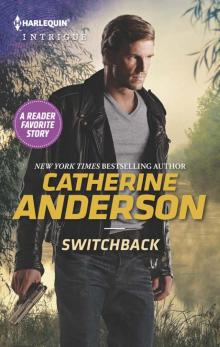 Switchback
Switchback Phantom Waltz
Phantom Waltz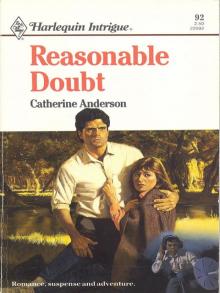 Resonable Doubt
Resonable Doubt Comanche Heart
Comanche Heart Sweet Nothings
Sweet Nothings Sun Kissed
Sun Kissed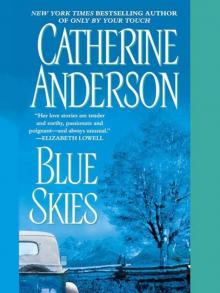 Blue Skies
Blue Skies Mulberry Moon
Mulberry Moon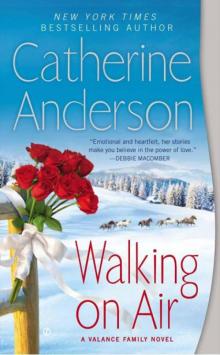 Walking on Air
Walking on Air Forever After
Forever After Only by Your Touch
Only by Your Touch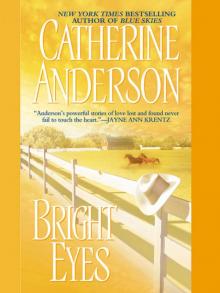 Bright Eyes
Bright Eyes Morning Light
Morning Light Indigo Blue
Indigo Blue Fancy Free (Three Times a Bride Anthology)
Fancy Free (Three Times a Bride Anthology) Cry of the Wild
Cry of the Wild Here to Stay
Here to Stay Star Bright
Star Bright The Christmas Room
The Christmas Room Coming Up Roses
Coming Up Roses My Sunshine
My Sunshine Cherish
Cherish Strawberry Hill
Strawberry Hill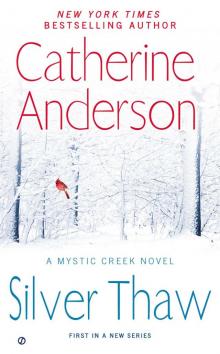 Silver Thaw
Silver Thaw Comanche Moon
Comanche Moon Spring Forward
Spring Forward Lucky Penny
Lucky Penny Early Dawn
Early Dawn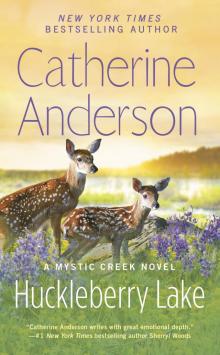 Huckleberry Lake
Huckleberry Lake Summer Breeze
Summer Breeze Without a Trace
Without a Trace Three Times a Bride
Three Times a Bride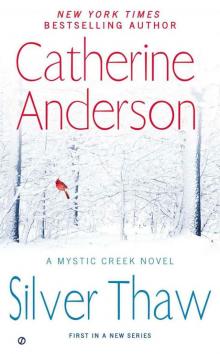 Silver Thaw: A Mystic Creek Novel
Silver Thaw: A Mystic Creek Novel